What causes lower back pain?
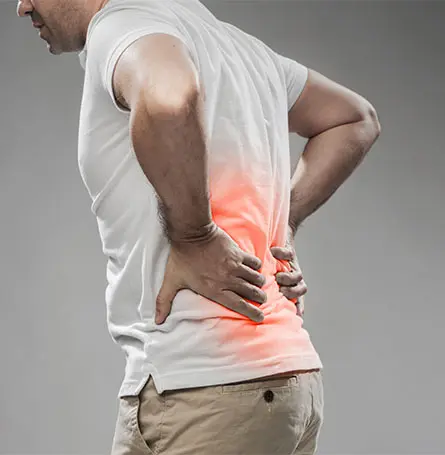
In order to discuss how to relieve pain, we need to know what's causing it first. And, as we've mentioned, we can generally point out two groups in this department.
First off, we have lifestyle choices. While we're all vaguely aware that we should be working out, eating healthy, and sitting up straight, we're not always aware of all the ways these habits can impact our health. So, yes, being overweight can even cause back pain!
However, in terms of back pain relief, these issues are relatively easy to deal with. After all, you just have to break a few nasty habits and your back pain should resolve itself. Plus, these kinds of changes will likely benefit you in other areas of your life as well!
The other group on the other hand isn't as easy to deal with. Medical conditions can cause severe pain throughout your back, can require long treatment plans, and can rely on pain relievers in the absence of a “cure”. But we'll cross that bridge when we get here. First, let's talk about things you can change right now.
Improper posture
Since it's one of the more obvious causes, we have to talk about postural back pain first. After all, with both our jobs and our leisure activities usually involving sitting down for long periods of time, it's not a surprise that bad posture is so prevalent.
And this isn't just a hypothesis, 81% of office workers sit down for anywhere between four and nine hours each day. So, it's safe to say that it's rather prevalent.
Plus, besides just causing lower back pain, bad posture can make existing pain worse, making it a double threat in some cases. So, take this as your daily reminder to straighten your back and avoid being hunched over.
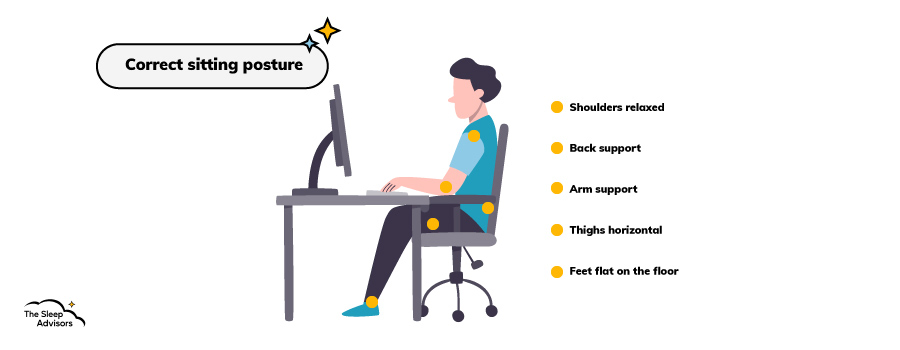
Lifting heavy objects
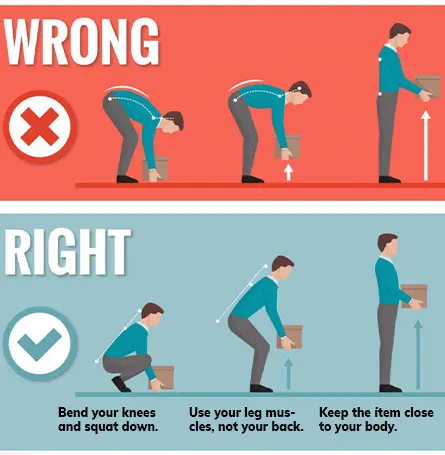
Be it at the gym or at work, proper form is crucial when lifting anything slightly heavier off the ground.
And the older you are, the easier it can be to hurt your lower back if you're not careful.
However, this should be an easy fix. Just lift with your legs and not your back, as demonstrated below.
It can feel a bit awkward at first but you'll get used to it at some point and won't have to worry about throwing your back out.
With that being said, proper form doesn't make you invincible.
So, don't try to lift something that your body can't handle. Not only can this cause back pain but you might get a side helping of leg pain as well.
Having the wrong mattress
Yes, even when you're sleeping, you're not safe from potential lower back pain triggers! And this is mostly due to the fact that a lot of people don't know what kind of mattress they need.
To keep it short, both your sleeping position and your weight affect the type of mattress you'll need. More precisely, how firm your mattress should be.
For example, if you sleep on your stomach and have a very soft mattress, your hips will sink into the upper layer, creating a forward curve and putting pressure on your lower back. So, you'd need a firm mattress to stop this from happening.
However, a good mattress for front sleepers won't be good for most side sleepers. This is because when you're on your side, you need your hip and shoulder to sink into the upper layer of the mattress so that your spine doesn't end up bent to the side.
So, check the table below, see where you land, and look for a mattress with the appropriate firmness level. We'll also talk in more detail about which mattress you need a bit later on. And if you want our full guide on choosing a mattress, you can check that article out as well.
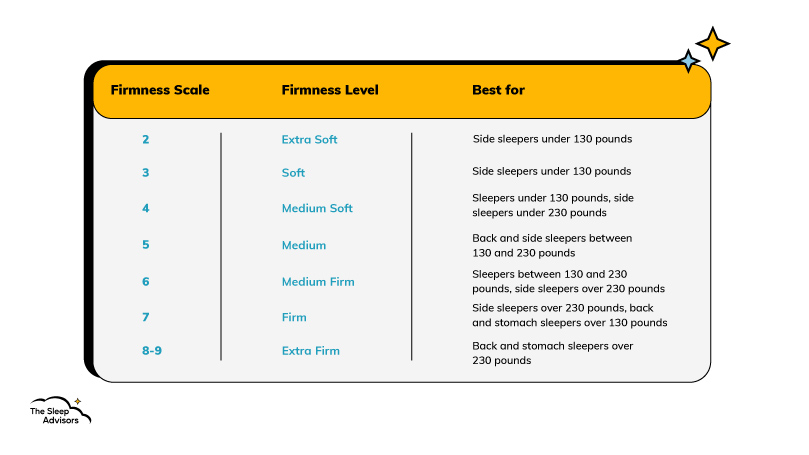
Unhealthy lifestyle habits
So far we've focused on more blatant and “direct” causes of low back pain. However, sometimes the cause of your back pain can seem rather arbitrary. And to avoid making this an hour-long read, we've decided to compile all of them here.
Also, do note that this isn't an extensive list. Even the most minute habits can potentially cause back pain in some people. We're just focusing on more widespread habits that you might be partaking in.
Being overweight
Aside from potentially causing a myriad of other problems, being overweight has also been shown to increase the odds of suffering from lower back pain. After all, the heavier an individual is, the more stress is put on their spinal cord throughout the day.
Plus, being overweight can sometimes correlate with other bad habits that further exacerbate the issue. So, being a healthy weight isn't just for posting cute selfies but also keeping your spine healthy.
Smoking
We're sure that at least a few of you had no idea that smoking can somehow affect your back. Everyone knows that it's bad for your lungs and your overall health but as it turns out, not even your back is safe.
A recent study has found that ex-smokers were more likely to have lower back pain than never-smokers. And current smokers were more likely to have lower back pain than ex-smokers.
So, in case you need one more reason to stop smoking, there you go.
Doing too much or too little
Since we've established that being overweight can cause lower back pain, it's normal to think that you should start being more active. And this is absolutely true!
However, we believe it's worth pointing out that exerting yourself too much can also cause lower back pain. For example, if you work out every single day. Alternatively, getting too much rest can also cause a few issues.
So, as this study points out, it's a U-shaped relationship. In other words, you absolutely should get some form of exercise regularly. However, don't overdo it! Your muscles need time to rest and even some simple stretches or aerobic back exercises can do the trick.
Medical conditions
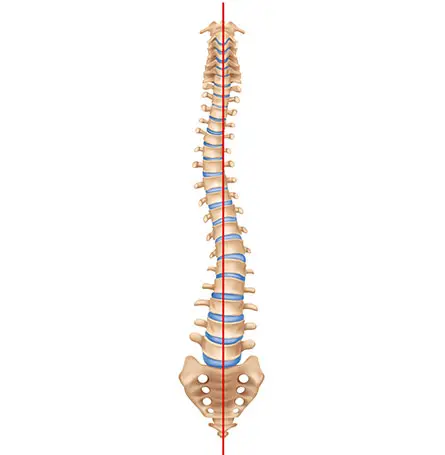
Of course, some people suffer from chronic back pain due to medical conditions or recent injuries.
And depending on the condition/injury, pain relief can be more or less difficult to come by.
For example, a strain in your back and abdominal muscles can be dealt with with an ice pack or some nonsteroidal anti-inflammatory drugs.
However, conditions such as spinal stenosis or scoliosis can be more difficult to treat. This is why it's so important to talk to your GP if your lower back pain persists for multiple days and/or if you have a family history of similar issues.
It's also worth noting that certain conditions, such as disc degeneration, are a lot more likely in older individuals, especially if they also have a more physically taxing job.
How to ease lower back pain
Now that we know what can cause lower back pain, let's finally get into the treatment. As you can imagine, the most obvious first step would be to fix any of the bad habits we've listed so far. Even just a few weeks of regular exercise and some weight loss could potentially provide the pain relief you're looking for.
However, this is far from the only option. Depending on the cause, physical therapy can also be extremely helpful. And when it comes to muscle spasms or strains, a treatment called transcutaneous electrical nerve stimulation could also prove to be rather useful.
So, let's go over a few ways you can reduce pain in your lower back and/or prevent it from ruining another early morning in the future.
But do note that this is for informative purposes and not a diagnosis. Sometimes pain signals more serious underlying issues and it's always best to have a medical professional give you a proper evaluation. Especially if the pain is persistent.
Relaxing your back muscles
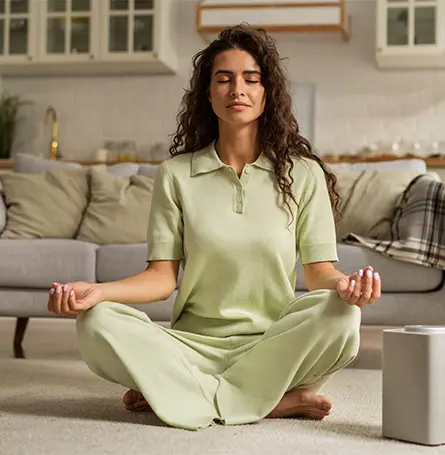
The most broadly applicable lower back pain treatment we can suggest is finding a way to relax your back muscles.
This could mean anything from getting a massage to increase blood flow and break up any knots you may have to taking muscle relaxants for more severe back pain.
Muscle, ligament and tendon strains are among the most common stressors for lower back pain so, allowing those muscles to relax a bit can help out significantly. Plus, this can help you relax in general!
And yes, even mental stress can cause lower back pain in some cases.
So, if you can schedule some massage therapy or take some pain relief medication, it can help – at least in the short term.
Strengthening your back muscles

As we've already established, moderate exercise can help out with both back pain and your general health.
It can help lose any excess weight, keep you from sitting down all day, and in the case of aerobic exercise, help loosen up those tight muscles.
However, working out also has the benefit of strengthening your back! And this can prevent lower back pain in the future as you'll be better prepared to lift heavier objects.
Plus, if you do weighted exercises and focus on form (as you should), you'll be more likely to properly lift things off the ground as well.
In other words, as long as you don't overexert yourself, it's all positives here! But, as we've mentioned, you don't have to go to the gym or use weights.
If you're more comfortable doing stretches or playing sports, that's absolutely fine. As long as you don't overdo it, any type of physical exercise should help out in the long run.
Choosing the right bedding

As we've briefly mentioned, there is a method to the madness when it comes to picking out the right mattress. Side sleepers generally want softer mattresses while stomach sleepers want firmer mattresses. And back sleepers fall somewhat in the middle.
Things such as zoned support and pressure relief are also important features to look for, especially if you suffer from back pain somewhat frequently.
And you'll know that it's your mattress' fault if you only have back pain in the morning.
However, if you can't quite afford a fancy new mattress, don't worry. For one, there are plenty of cheaper mattresses that can still help keep your spine healthy. Plus, a good mattress topper can “correct” your current mattress a bit.
In other words, if your mattress is too soft (which is common if you're a front sleeper), get a firm mattress topper! And if your mattress is too firm, get a soft and light topper instead.
Medical treatment

If your lower back pain is caused by an underlying medical condition or an injury, you'll likely need medical treatment. And depending on what exactly is causing pain and how severe it is, different treatment plans can be put into practice.
For muscle pains or spasms, muscle relaxants, narcotics, pain relievers, or even antidepressants can be prescribed. And for cases such as sciatica, your GP might recommend certain lifestyle changes alongside prescribed medication.
However, in cases of chronic pain or chronic conditions, surgery might be the only long-term solution. For example, Cortisone injections for some types of nerve damage or creating more space in your spine in some cases of disc degeneration.
And we're being rather vague here as treatment options can vary quite greatly. After all, depending on whether the issue is caused by your lower spine, the surrounding nerves, the lower back muscles, or a combination of the three, different procedures might be more or less effective.
Conclusion
In conclusion, depending on the underlying cause, treating lower back pain can be very simple or very complex. For some, a few simple lifestyle changes might just do the trick! So, sit up straight, lift with your legs, get some exercise in and do your best to stay at a healthy weight.
Even if you don't have lower back pain, these are just good habits to have. And you'll likely be grateful in the future when you're one of the few with no back pain whatsoever!
However, if you've had lower back pain for quite some time, and these tips don't seem to be helping, make sure to consult your GP. After all, if nothing else, we hope this article has cued you in on how many different factors can result in lower back pain. So, it's best to have it checked out and plan your treatment accordingly.

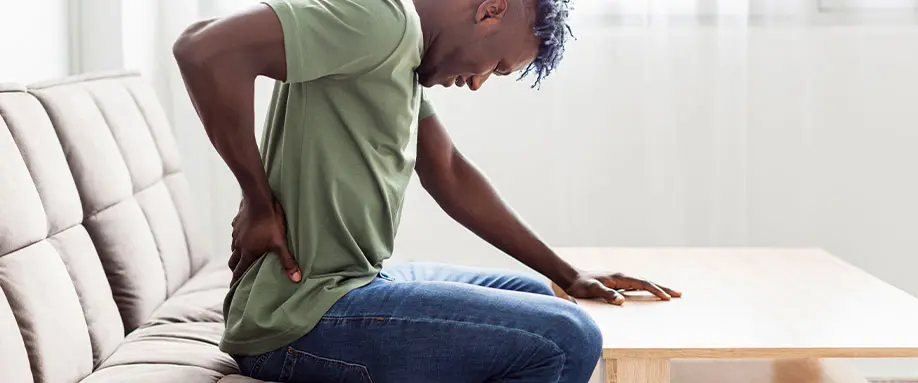












There are no comments yet
"*" indicates required fields